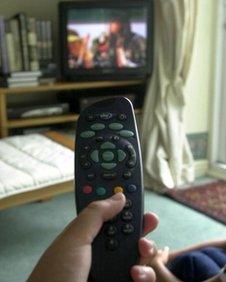'Two million Freeview homes' facing 4G interference
- Published

Some two million households could be affected
Next generation mobile services have the potential to cause interference issues for up to two million UK households, the head of Freeview has warned.
Ilse Howling has called on the government to make sure there are sufficient funds to deal with the problem.
Millions of homes are likely to need filters installed to mitigate the issue.
4G services will be launched next year.
Spectrum freed up by the switch over to digital TV is highly sought after by mobile operators, because it offers in-building coverage and promises to speed up services significantly.
<bold>Loss of channels</bold>
But because the 4G spectrum will sit next to that used by the free-to-air digital platform Freeview, there could be a problem.
"They are butted up against each other. As 4G services are launched next year there will be interference," said Ms Howling.
Currently 24 million households in the UK watch TV via Freeview. Of these around half use Freeview as their sole TV platform, according to the firm.
Homes within two kilometres (1.24 miles) of a 4G base station are likely to experience interference and, for some, there will also be a loss of channels.
The Department for Culture, Media and Sport (DCMS) has announced contingency plans for those affected by interference.
Filters will be fitted to some houses, while those worst affected will need to be transferred to other platforms, such as satellite and cable. The costs for this will be paid by the mobile operators who take over the spectrum.
Ms Howling told the BBC that the government has underestimated the amount of money needed to fix the problem.
<bold>'No funding'</bold>
"It has set aside £180m - but we think it will actually cost £400m," she said.
For some houses, fitting the filter will be relatively easy and can be done by the householder.
But for the majority - 83% - an aerial installer will need to complete the installation.
"There has been no funding set aside for this," said Ms Howling.
"It isn't fair. These people have bought into Freeview in good faith and are suddenly being asked to pay out around £100.
"For many Freeview viewers it is their only way of watching TV and we want to make sure their interests are looked after."
A spokesman from the DCMS said: "There will be some interference when 4G services are rolled out but we will have the solutions in place to eliminate the disruption to television viewers.
"The vast majority of affected households will simply need to fit their TV with a filter that will be supplied by the help scheme."
He added that extra help would be available for the over-75s and those registered disabled.
Ms Howling has already met MPs to discuss the issue and is due to meet Culture Minister Ed Vaizey soon.
4G services are due to be rolled out in 2013. The auction to share out the airwaves is set to take place at the end of the year, although the process has already been held up several times.
Everything Everywhere, which operates the Orange and T-Mobile brands, is hoping to roll out 4G services ahead of the auction, using its existing 3G network. 4G delivered in this way will not cause interference.
- Published8 March 2012
- Published2 June 2011